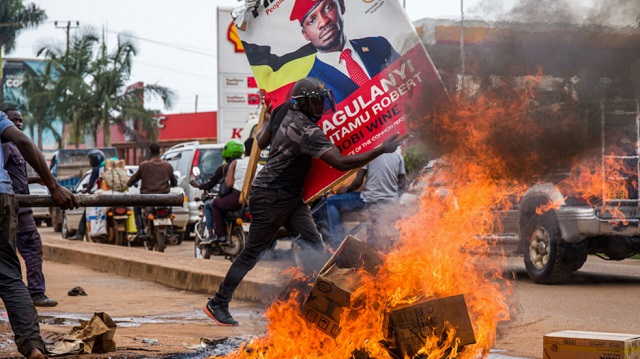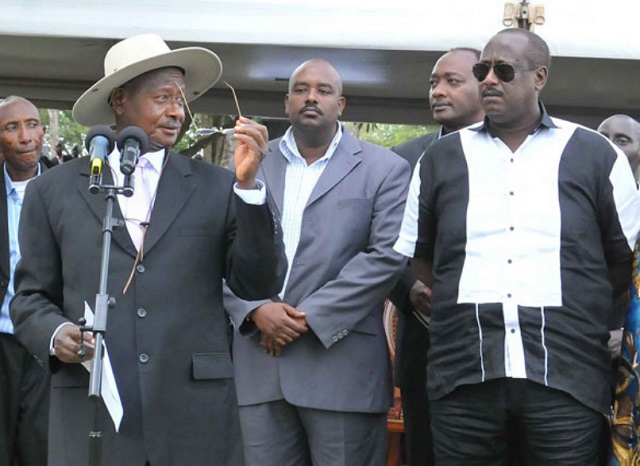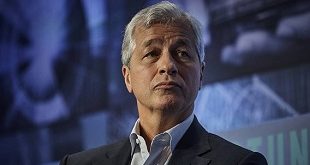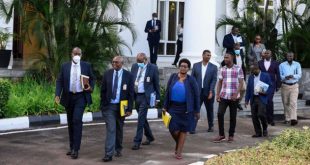
Economic networks
Meanwhile, the economic networks that sustain the Uganda shadow state are predominantly domestic. Funds for election campaigning, for example, are mainly generated by raiding the public purse and securing kickbacks from Ugandan business people. This is because, prior to the recent discovery of commercially viable oil reserves, the Ugandan economy was predominantly agricultural.
The researchers say although Museveni’s regime benefitted from high in-flows of foreign aid during its period as a “donor darling,” before his reputation as a progressive leader was undermined by creeping authoritarianism, the shadow state appears to have developed less extensive international financial connections. The exception has been the outside involvement in the smuggling of high-value mineral resources out of the DRC – done by military forces.
The researchers say the emerging mining and oil sectors could generate stronger ties to international economic networks over time. They mention Gen. Salim Saleh’s relationships with Chinese investors, his wife; Jovia Akandwanaho’s cross border activities, including trade in diamonds and narcotics, and Maj. Gen. Leo Kyanda, the Joint chief of staff.
They mention Esteri, Saleh and Jovia’s daughter who manages several of the family business interests, and co-own the production company, Isaias 60, with Museveni’s daughter, Natasha. Business people Kellen Kayonga, treasurer of the Uganda Chamber of Mines and Petroleum, and Barnabas Taremwa, a well-known player in the mining sector, are mentioned.
Outside of such close family ties, names like former long-serving cabinet minister, Henry Kajura from Bunyoro are mentioned. Others are recently deceased matriarch, Constance Muhangazima, and her offspring (Andrew Mwenda, Gen. Kayanja Muhanga, and sister, Margaret Muhanga) from Tooro are mentioned.
In non-western regions, Richard Todwong, the younger brother of UPDF reserve force commander, Maj. Gen. Otema Awany, from Acholi are mentioned.
The researchers note that high profile members of the Ugandan shadow state have also been linked to the narcotics trade. Most notably, during the July 2019 trial of the Kenyan–Indian Akasha brothers in the United States. One of the president’s in-laws was documented as an importer of ephedrine, which is often used to produce methamphetamine, more commonly known as crystal meth.
“It is important to note, however, that this does not mean that the whole state has been criminalised or is dependent on the proceeds of illicit trade,” the researchers say, “Nonetheless it does demonstrate just how damaging the shadow state can be, in particular its capacity to undermine the rule of law.”
The researchers say manipulation of public funds in Uganda occurs through straightforward patronage and the distribution of development funds to reward ruling party supporters through the formal state. But when illicit economic activities are used to raise funds, business people get privileged access to the corridors of power. Those closely connected to the regime are able to amass great wealth while generating funds to support ruling party election campaigns.
They say those that do not engage in political activities against Museveni’s regime are largely left alone. But those who are thought to have opposition leanings or who become so wealthy that they have the potential to finance an opposition campaign—such as Charles Mbire, Patrick Bitature and Mohan Kiwanuka—are integrated into Museveni’s networks to ensure that opposition candidates do not have access to private funding.
The research was done when Keith Muhakanizi was permanent secretary to the treasury and the researchers say he was strategically placed to manipulate government finances. They point out how in 2014, Bank of Uganda (BoU) governor, Emmanuel Tumusiime-Mutebile, admitted that he had been ‘misled’ to finance election campaigns from central Bank coffers.
They name Kampala business person, Ben Kavuya, who is one of the biggest money lenders. Some businesses are bound to the regime through tax exemptions, which enable them to make inflated profits while denying the treasury valuable resources.
They talk of how Danze, a company set up by the ruling party, was engaged in large-scale smuggling in the 1990s. They also mention Dott Services, an Indian-owned construction and engineering company, Operation Wealth Creation, and the Youth Livelihood Funds.
Ultimately, Cheeseman says, one of the most popular framework used to conceptualise Africa over the last 30 years, neopatrimonialism, depicts African politics as a struggle between the formal rules set down in constitutions and legislation, on the one hand, and the informal networks and relationships emanating from the head of government; the president or sometimes the prime minister, on the other.
Cheeseman describes the shadow state as the complex networks of people that wield considerable influence in many countries. They are the underbelly of the formal state as set down in constitutions and legislation; the informal power structure that networks depend on to maintain their economic and political privileges.
He says members of the shadow state collude to wield political, social and economic authority for their own benefit and that the actors are both domestic and international. Some are elected others are not and some hold official positions others do not.
Politically connected business elites and private companies can even manipulate the economy as seen when, on September 19, 2019 companies linked to the president and military elites in Zambia, fearing a currency collapse, used their protected political status to illegally purchase a vast amount of U.S. dollars on the parallel market, fuelling higher exchange rates. The price of food was pushed up, confidence in the currency was undermined, and inflation rose.

Members of the shadow state could be:
- business leaders
- bank managers and central bank officials
- senior members of the judiciary
- members of the electoral commission
- members of the tax authority
- members of regulatory bodies in areas such as land & planning, safety and food production
- political fixers (brokers)
- media owners
- traditional, ethnic and religious leaders
- senior officials in the security forces
- militias and private security
- family members of the above
- multinational companies, economic brokers, and foreign banks
- international supporters, including foreign governments
- transnational criminal networks
****
 The Independent Uganda: You get the Truth we Pay the Price
The Independent Uganda: You get the Truth we Pay the Price



Wow… Mwenda must be onto something…….. keeping eyes on the ball…… hoping cheeseman is not Besigye or Winnie.
This finally is an article from Mwendas paper that is highly factual and not simply pontificating and making wild allegations.
A well researched piece of work with reference to the work of prof Cheeseman to Extrapolate Uganda politics . You do not go far to see the neo-patrimonialism – absolute ruler using his power to amend the instruments of governance- courts, media parliament and civil society.